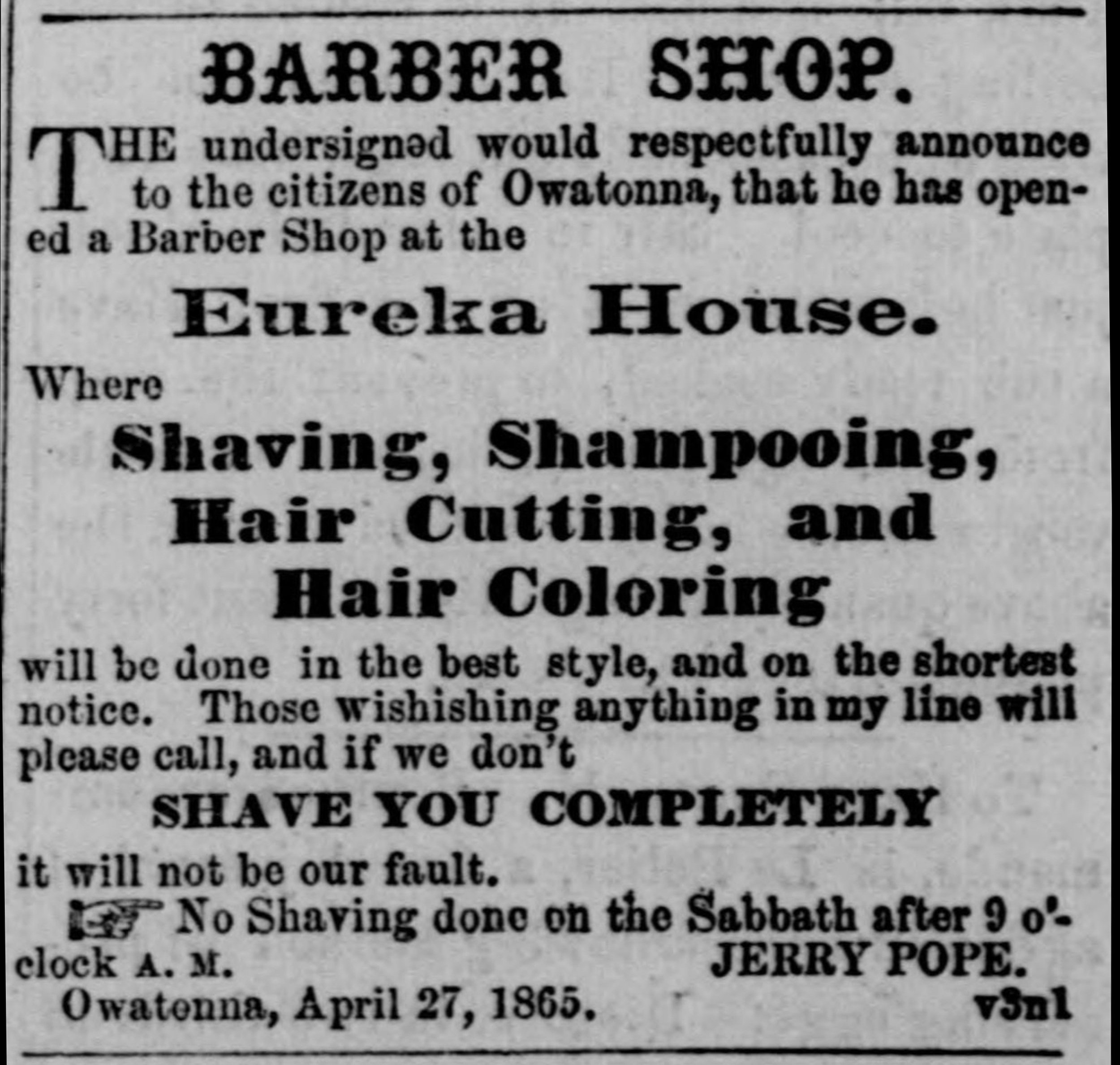Jerry Pope: The Trailblazing Barber of Owatonna
Jerry Pope and his family's 1864 arrival in Owatonna established them as the first known Black family in Steele County, Minnesota
Moving to Minnesota
In 1864, Jerry and Jane Pope made a significant move to Owatonna with their children, stepping into a new community as the Civil War was drawing to a close. This move placed them as the first known Black family in Steele County, marking a notable moment in the area's history.
Their story, while personal, sheds light on the broader experience of early Black residents in Minnesota, navigating the complexities of a post-war America. As is the case for many of the early African American residents in Minnesota, to date, no photos of the Popes or their children have been located. Jerry’s story is being told through records and a wonderful collection of newspaper clippings documenting his time in Owatonna.
Jerry and Jane Pope, along with their children, made a big move to Owatonna, Steele County, Minnesota, in 1864. This was a new start for them, away from the difficult lives they had in the South where they were born into slavery. Jerry was from Georgia, and Jane was from Kentucky. Not much is known about their journey to Minnesota, but their arrival marked the beginning of something special.
By 1865 Jerry and Jane were settled in their home along with four children: William, Victoria, Jerry, Jr., and Judy. However, only William is mentioned in later records, hinting at the challenges they faced during those early years.
1865 Minnesota State Census - Jerry Pope and family - Owatonna, Steele County, MN
Eureka House: Not Just Any Barbershop
In 1865, Jerry opened his very own barbershop called the Eureka House. Although Jerry had no formal education, having started his life as an enslaved person in Georgia, he was able to learn the barbering trade and became a skilled barber and an entrepreneur. His barbershop was a place where people from the town, no matter their background, came together.
Opening of Jerry Pope’s Eureka House barber shop - Owatonna Plaindealer - June 1, 1865
Teaching the Next Generation
Jerry Pope, like many early Black barbers, was more than just a skilled tradesman, he was a mentor and teacher. He helped many young Black men learn the barbering trade, including his son William. These young barbers went on to open their own shops, in towns throughout Minnesota and beyond.
Jerry's Bigger Role
Jerry wasn't just known in Owatonna; he was a well-known figure in Minnesota's early African American community and beyond. He worked hard for his community, standing up for what he believed in and even running for local office to make a difference.
Jerry Pope returned from Marshalltown, Iowa - The People's Press - August 10, 1878
Jerry Pope ran for two local government positions - Owatonna Journal - March 19, 1880
Universally Esteemed
Jerry Pope passed away at his home in Owatonna on June 8, 1894 at the age of 67. According to his obituary: “Mr. Pope was universally esteemed in this community and was regarded as a good citizen. He was brought up in slavery without any opportunity of securing an education, but did his part as well as could be expected under such discouraging circumstances.”
Jerry Pope’s Obituary - The People's Press - June 8, 1894
Despite being born into bondage, Jerry Pope carved out a remarkable life in Minnesota. His barbershop was a gathering place, his mentorship uplifted others, and his civic engagement strove to create a more equitable society. Jerry Pope was truly a trailblazer whose journey blazed a path for future generations.





